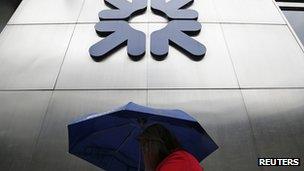RBS investor thinks bank split 'unlikely'
- Published

Supporters of a break-up of RBS include former Bank of England governor Sir Mervyn King
An institutional shareholder in Royal Bank of Scotland thinks it is "extremely unlikely" state-backed RBS will be split into good and bad banks.
Standard Life Investments's (SLI) global head of equities, David Cumming, told the BBC such a move would be an "unnecessary distraction".
Edinburgh-based SLI is one of the biggest institutional investors in RBS.
A UK government-commissioned report on the issue is imminent and may emerge with RBS's quarterly results on Friday.
RBS, which was bailed out for £45bn in 2008 at the height of the financial crisis, is 81% taxpayer-owned.
Investment bank Rothschild has been tasked with setting out the pros and cons of the separation of RBS's non-core division into a new "bad bank".
'Acceptable outcome'
But Mr Cumming said: "I think the creation or a separate, nationalised, bad bank, is extremely unlikely.
"I think RBS has been running down their non-core assets, ie the bad bank, pretty efficiently over the past few years, and I don't think a breakup would improve the process."
He said he believed this was a view that Chancellor George Osborne and the Rothschilds were coming to now.
Mr Cumming added: "I think, however, to appease the politicians, they will do something, so I think you will get a more formalised process of a creation of a bad bank within RBS.
"And maybe they will state that they are going to run the non-core assets, or bad bank, down more quickly, and I think that will probably be a more acceptable outcome."
Supporters of a break-up of RBS include former Bank of England governor Sir Mervyn King and ex-UK Chancellor Nigel Lawson.
- Published19 October 2013
- Published1 October 2013